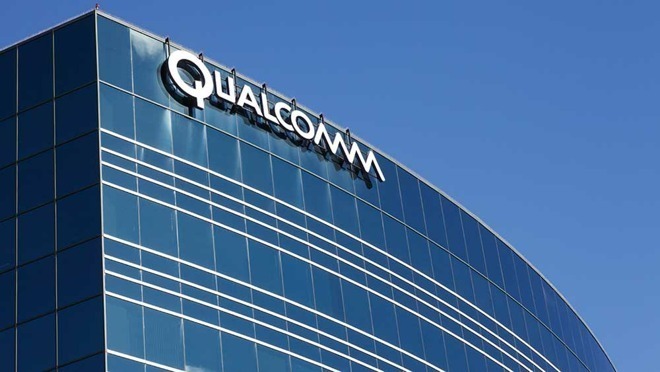Apple payment to Qualcomm estimated at $6 billion, with $9 per iPhone sold in royalties
The settlement between Apple and Qualcomm to end lawsuits over patent licensing and infringement is costing Apple nearly $9 per iPhone on top of a single $6 billion payment, according to UBS.

On Tuesday, Apple and Qualcomm prematurely ended the patent licensing trial by announcing a settlement, one where Apple would pay an undisclosed amount to Qualcomm as well as arranging a patent licensing agreement. In a research note from UBS seen by AppleInsider, the deal was extremely beneficial to Qualcomm.
UBS suspects that Apple was having trouble securing non-Qualcomm 5G modems for the 2020 iPhone refresh. Taken along with 18-month development times for iOS devices, this apparently put Apple in a "tough position," and prompted the settlement.
While Qualcomm has stayed quiet about how much it will be earning, aside from anticipating a $2 per share incremental EPD for the next quarter, UBS suggests the amount Apple will be paying per device is in the range of $8 to $9 per device. This is a "solid outcome" to Qualcomm, higher than the $5 assumed by the firm previously.
The earnings per unit do not include a "bullet payment" for royalties in arrears from Apple, which UBS pegs at between $5 billion and $6 billion.
The return of Qualcomm to Apple's modem supply chain for 2020, as well as Intel's bowing out of the 5G smartphone modem market, has helped increase UBS' valuation of Qualcomm. The firm maintains a "neutral" rating on Qualcomm's stock, but has raised its 12-month price target from $55 to $80, just above the $79 Qualcomm stock value at the time of publication.

On Tuesday, Apple and Qualcomm prematurely ended the patent licensing trial by announcing a settlement, one where Apple would pay an undisclosed amount to Qualcomm as well as arranging a patent licensing agreement. In a research note from UBS seen by AppleInsider, the deal was extremely beneficial to Qualcomm.
UBS suspects that Apple was having trouble securing non-Qualcomm 5G modems for the 2020 iPhone refresh. Taken along with 18-month development times for iOS devices, this apparently put Apple in a "tough position," and prompted the settlement.
While Qualcomm has stayed quiet about how much it will be earning, aside from anticipating a $2 per share incremental EPD for the next quarter, UBS suggests the amount Apple will be paying per device is in the range of $8 to $9 per device. This is a "solid outcome" to Qualcomm, higher than the $5 assumed by the firm previously.
The earnings per unit do not include a "bullet payment" for royalties in arrears from Apple, which UBS pegs at between $5 billion and $6 billion.
The return of Qualcomm to Apple's modem supply chain for 2020, as well as Intel's bowing out of the 5G smartphone modem market, has helped increase UBS' valuation of Qualcomm. The firm maintains a "neutral" rating on Qualcomm's stock, but has raised its 12-month price target from $55 to $80, just above the $79 Qualcomm stock value at the time of publication.

Comments
But you'd never know this looking at the QCOM stock surge over the last couple of days
That said, if UBS is estimating $8-9 per device for total licensing costs going forward, I could believe that. That's a little higher than I would guess, but in the ballpark. I'd be surprised if it isn't something between $5-10.
Beyond the per-device cost, the other terms of the agreement are important. Did Apple have to agree to chip supply exclusivity to get to that cost? I doubt it. Is Qualcomm now being clear on what IP is covered? I would hope so. Are the accounting requirements more to Apple's liking? What IP is Apple being required to cross license, and is it accounted for in whatever the per-device cost is? And what does the agreement look like with regard to chip pricing?
I cannot reveal my source, but I am absolutely certain that you have no source.
i don’t think I would want to waste my time reading it.
Apple wasn’t backed into a corner. They had the upper hand in this case along with the precedent of the fact Qualcomm has lost EVERY antitrust case brought against them for how they license their modems and cellular related IP.
Apple could have waited until the court case was finished (which they would have won) and then turned around to buy Qualcomm modems (which they’d happily sell to Apple).
Apple wasn’t in any sort of “bind” over 5G modems - they had the option of Qualcomm all along.
On another subject. I'm wondering if the lawsuit against Qualcomm concerning anti trust violations can use this agreement as some sort of proof that Qualcomm, by forcing phone makers into exclusive contracts, ended up with a near monopoly in the modem chip market. Thus no other chip makers were able to get a foothold in the market. Therefore, Apple only had one viable source for the chip they need and was forced to settle with Qualcomm, for more than they would like to had pay.
As for you second paragraph: No. The trial in that case has already concluded. New evidence won't be admitted. Indeed, new evidence was cut off some time before the trial started. Judge Koh had actually ruled on some evidence which came out after discovery was finished, and which one of the parties wanted to have admitted, deciding that it wouldn't be allowed.